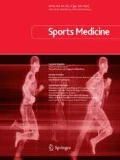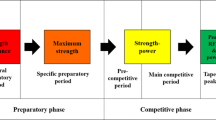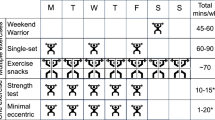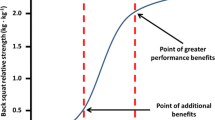Abstract
The principle of progressive overload must be adhered to for individuals to continually increase muscle size with resistance training. While the majority of trained individuals adhere to this principle by increasing the number of sets performed per exercise session, this does not appear to be an effective method for increasing muscle size once a given threshold is surpassed. Opposite the numerous studies examining differences in training loads and sets of exercise performed, a few studies have assessed the importance of training frequency with respect to muscle growth, none of which have tested very high frequencies of training (e.g., 7 days a week). The lack of studies examining such frequencies may be related to the American College of Sports Medicine recommendation that trained individuals use split routines allowing at least 48 h of rest between exercises that stress the same muscle groups. Given the attenuated muscle protein synthetic response to resistance exercise present in trained individuals, it can be hypothesized that increasing the training frequency would allow for more frequent elevations in muscle protein synthesis and more time spent in a positive net protein balance. We hypothesize that increasing the training frequency, as opposed to the training load or sets performed, may be a more appropriate strategy for trained individuals to progress a resistance exercise program aimed at increasing muscle size.


Similar content being viewed by others
References
American College of Sports Medicine. American College of Sports Medicine position stand. Progression models in resistance training for healthy adults. Med Sci Sports Exerc. 2009;41:687–708.
Alway SE, Grumbt WH, Stray-Gundersen J, et al. Effects of resistance training on elbow flexors of highly competitive bodybuilders. J Appl Physiol. 1985;1992(72):1512–21.
DeFreitas JM, Beck TW, Stock MS, et al. An examination of the time course of training-induced skeletal muscle hypertrophy. Eur J Appl Physiol. 2011;111:2785–90.
Ogasawara R, Thiebaud RS, Loenneke JP, et al. Time course for arm and chest muscle thickness changes following bench press training. Interv Med Appl Sci. 2012;4:217–20.
Volek JS, Volk BM, Gómez AL, et al. Whey protein supplementation during resistance training augments lean body mass. J Am Coll Nutr. 2013;32:122–35.
Brook MS, Wilkinson DJ, Mitchell WK, et al. Skeletal muscle hypertrophy adaptations predominate in the early stages of resistance exercise training, matching deuterium oxide-derived measures of muscle protein synthesis and mechanistic target of rapamycin complex 1 signaling. FASEB J. 2015;29:4485–96.
Abe T, DeHoyos DV, Pollock ML, et al. Time course for strength and muscle thickness changes following upper and lower body resistance training in men and women. Eur J Appl Physiol. 2000;81:174–80.
Morton RW, McGlory C, Phillips SM. Nutritional interventions to augment resistance training-induced skeletal muscle hypertrophy. Front Physiol. 2015;245. doi:10.3389/fphys.2015.00245.
Burd NA, West DWD, Staples AW, et al. Low-load high volume resistance exercise stimulates muscle protein synthesis more than high-load low volume resistance exercise in young men. PloS One. 2010;5:e12033.
Kumar V, Selby A, Rankin D, et al. Age-related differences in the dose–response relationship of muscle protein synthesis to resistance exercise in young and old men. J Physiol. 2009;587:211–7.
Mitchell CJ, Churchward-Venne TA, West DWD, et al. Resistance exercise load does not determine training-mediated hypertrophic gains in young men. J Appl Physiol. 1985;2012(113):71–7.
Hackett DA, Johnson NA, Chow C-M. Training practices and ergogenic aids used by male bodybuilders. J Strength Cond Res. 2013;27:1609–17.
Kumar V, Atherton PJ, Selby A, et al. Muscle protein synthetic responses to exercise: effects of age, volume, and intensity. J Gerontol A Biol Sci Med Sci. 2012;67:1170–7.
Martín-Hernández J, Marín PJ, Menéndez H, et al. Muscular adaptations after two different volumes of blood flow-restricted training. Scand J Med Sci Sports. 2013;23:e114–20.
Ostrowski KJ, Wilson GJ, Weatherby R, et al. The effect of weight training volume on hormonal output and muscular size and function. J Strength Cond Res. 1997;11:148–54.
Krieger JW. Single vs. multiple sets of resistance exercise for muscle hypertrophy: a meta-analysis. J Strength Cond Res. 2010;24:1150–9.
Fisher J. Beware the meta-analysis: is mutliple set training really better than single set training for muscle hypertrophy. J Exerc Physiol Online. 2012;15:23–30.
Loenneke JP, Fahs CA, Wilson JM, et al. Blood flow restriction: the metabolite/volume threshold theory. Med Hypotheses. 2011;77:748–52.
Symons TB, Sheffield-Moore M, Wolfe RR, et al. A moderate serving of high-quality protein maximally stimulates skeletal muscle protein synthesis in young and elderly subjects. J Am Diet Assoc. 2009;109:1582–6.
Burd NA, West DWD, Moore DR, et al. Enhanced amino acid sensitivity of myofibrillar protein synthesis persists for up to 24 h after resistance exercise in young men. J Nutr. 2011;141:568–73.
MacDougall JD, Gibala MJ, Tarnopolsky MA, et al. The time course for elevated muscle protein synthesis following heavy resistance exercise. Can J Appl Physiol. 1995;20:480–6.
Phillips SM, Tipton KD, Aarsland A, et al. Mixed muscle protein synthesis and breakdown after resistance exercise in humans. Am J Physiol. 1997;273:E99–107.
Damas F, Phillips S, Vechin FC, et al. A review of resistance training-induced changes in skeletal muscle protein synthesis and their contribution to hypertrophy. Sports Med. 2015;45:801–7.
Bohé J, Low JFA, Wolfe RR, et al. Latency and duration of stimulation of human muscle protein synthesis during continuous infusion of amino acids. J Physiol. 2001;532:575–9.
Häkkinen K, Kallinen M. Distribution of strength training volume into one or two daily sessions and neuromuscular adaptations in female athletes. Electromyogr Clin Neurophysiol. 1994;34:117–24.
Wernbom M, Augustsson J, Thomeé R. The influence of frequency, intensity, volume and mode of strength training on whole muscle cross-sectional area in humans. Sports Med. 2007;37:225–64.
Schoenfeld BJ, Ogborn D, Krieger JW. Effects of resistance training frequency on measures of muscle hypertrophy: a systematic review and meta-analysis. Sports Med. doi:10.1007/s40279-016-0543-8. Epub 21 Apr 2016.
Schoenfeld BJ, Ratamess NA, Peterson MD, et al. Influence of resistance training frequency on muscular adaptations in well-trained men. J Strength Cond Res. 2015;29:1821–9.
Gentil P, Fischer B, Martorelli AS, et al. Effects of equal-volume resistance training performed one or two times a week in upper body muscle size and strength of untrained young men. J Sports Med Phys Fitness. 2015;55:144–9.
Benton MJ, Kasper MJ, Raab SA, et al. Short-term effects of resistance training frequency on body composition and strength in middle-aged women. J Strength Cond Res. 2011;25:3142–9.
Candow DG, Burke DG. Effect of short-term equal-volume resistance training with different workout frequency on muscle mass and strength in untrained men and women. J Strength Cond Res. 2007;21:204–7.
McLester JR, Bishop P, Guilliams M. Comparison of 1 day and 3 days per week of equal-volume resistance training in experienced subjects. Med Sci Sports Exerc. 1999;31:S117.
Murlasits Z, Reed J, Wells K. Effect of resistance training frequency on physiological adaptations in older adults. J Exerc Sci Fit. 2012;10:28–32.
Thomas MH, Burns SP. Increasing lean mass and strength: A comparison of high frequency strength training to lower frequency strength training. Int J Exerc Sci. 2016;9:159–67.
Bickel CS, Cross JM, Bamman MM. Exercise dosing to retain resistance training adaptations in young and older adults. Med Sci Sports Exerc. 2011;43:1177–87.
Hamilton DL, Philp A, MacKenzie MG, et al. Molecular brakes regulating mTORC1 activation in skeletal muscle following synergist ablation. Am J Physiol Endocrinol Metab. 2014;307:E365–73.
Ogasawara R, Kobayashi K, Tsutaki A, et al. mTOR signaling response to resistance exercise is altered by chronic resistance training and detraining in skeletal muscle. J Appl Physiol. 1985;2013(114):934–40.
Ogasawara R, Yasuda T, Ishii N, et al. Comparison of muscle hypertrophy following 6-month of continuous and periodic strength training. Eur J Appl Physiol. 2013;113:975–85.
Mitchell CJ, Churchward-Venne TA, Parise G, et al. Acute post-exercise myofibrillar protein synthesis is not correlated with resistance training-induced muscle hypertrophy in young men. PLoS One [Internet]. 2014;9(2):e89431.
Kumar V, Atherton P, Smith K, et al. Human muscle protein synthesis and breakdown during and after exercise. J Appl Physiol. 1985;2009(106):2026–39.
Glynn EL, Fry CS, Drummond MJ, et al. Muscle protein breakdown has a minor role in the protein anabolic response to essential amino acid and carbohydrate intake following resistance exercise. Am J Physiol Regul Integr Comp Physiol. 2010;299:R533–40.
Mitchell CJ, Churchward-Venne TA, Cameron-Smith D, et al. What is the relationship between the acute muscle protein synthesis response and changes in muscle mass? J Appl Physiol. 1985;2015(118):495–7.
Author information
Authors and Affiliations
Corresponding author
Ethics declarations
Funding
No sources of funding were used to assist in the preparation of this article.
Conflict of interest
Scott Dankel, Kevin Mattocks, Matthew Jessee, Samuel Buckner, J. Grant Mouser, Brittany Counts, Gilberto Laurentino, and Jeremy Loenneke have no conflicts of interest relevant to the content of this review.
Rights and permissions
About this article
Cite this article
Dankel, S.J., Mattocks, K.T., Jessee, M.B. et al. Frequency: The Overlooked Resistance Training Variable for Inducing Muscle Hypertrophy?. Sports Med 47, 799–805 (2017). https://doi.org/10.1007/s40279-016-0640-8
Published:
Issue Date:
DOI: https://doi.org/10.1007/s40279-016-0640-8




